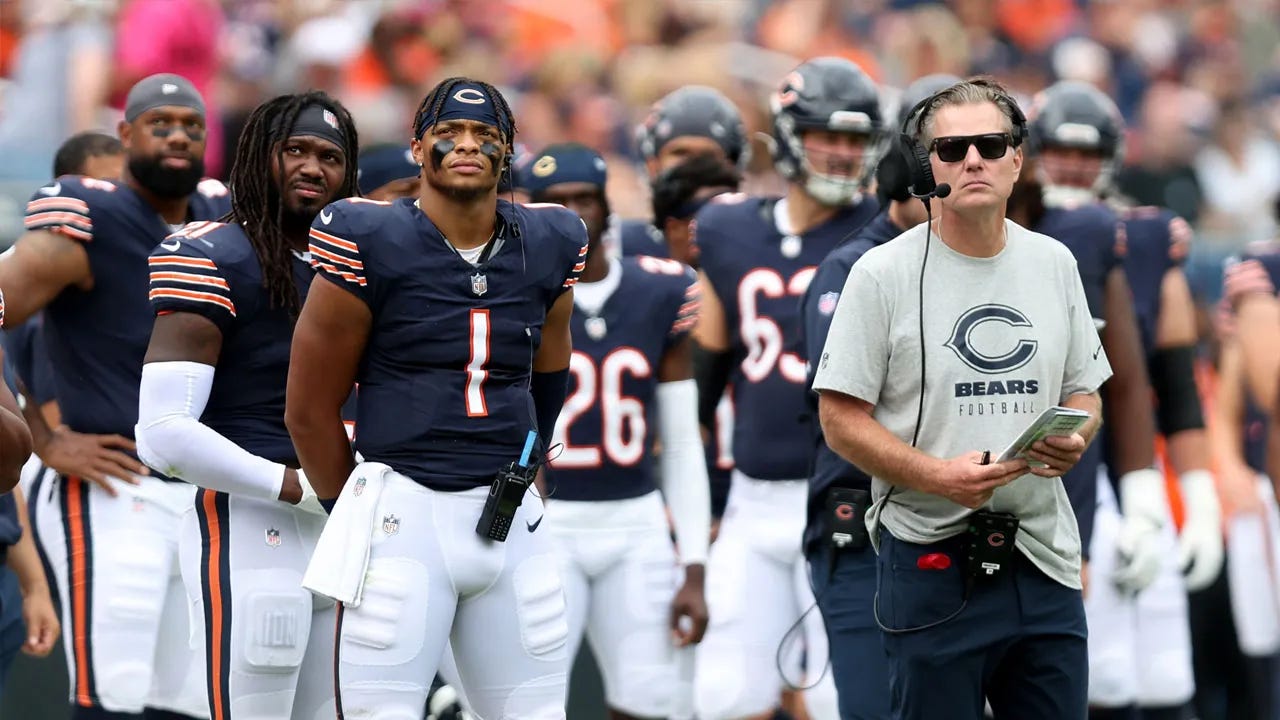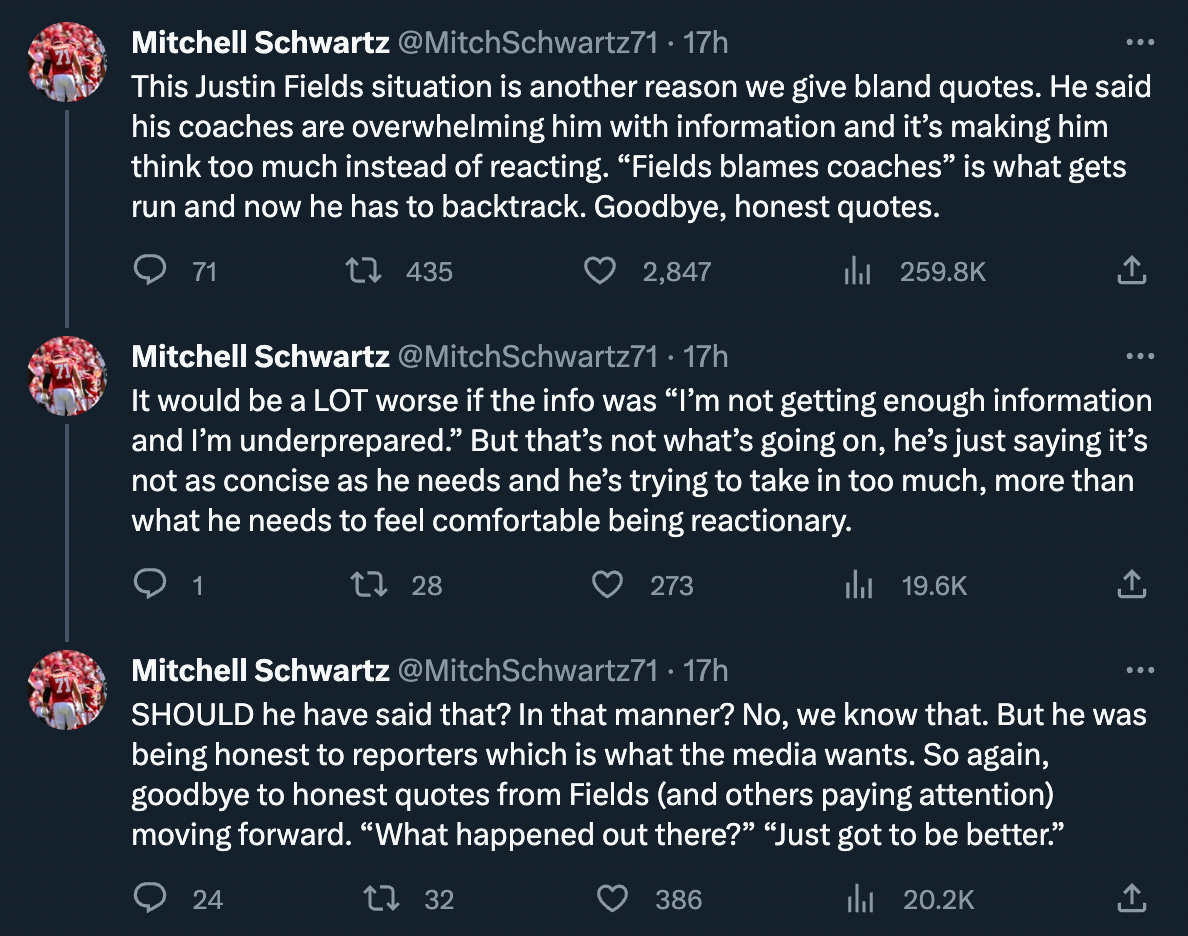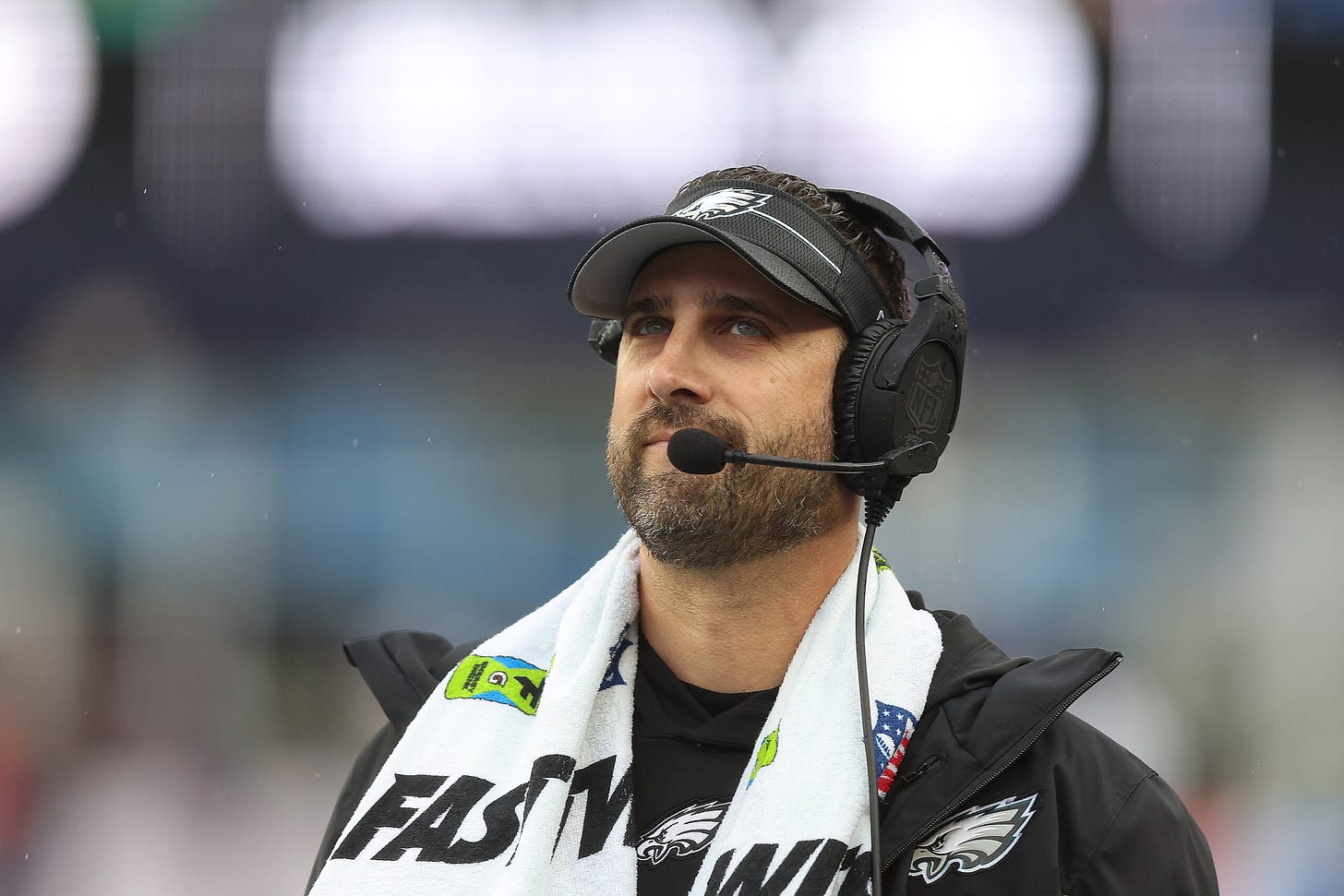Weekly Commentary & Review #11
Media wants you to know that the Bears are *really* imploding, new research on 2-point conversions, can the Browns offense survive without Nick Chubb
This post looks at the storylines of the week, whether relevant articles, analyses or other news from the week that provide useful insight to absorb, or missing context to add.
Last week, I didn’t produce a commentary, but gave my best evidence-based take on what the Jets should do at quarterback, comparing Zach Wilson’s range of outcomes versus other options.
THE BEARS ARE IMPLODING!!!!!!!!
In this newsletter, we try and focus on what really matters to increase our understanding of the game, which means talking less about the dominant storylines with which we agree. I’d rather try to add to understanding and knowledge on why what you’re seeing and hearing might not be the case.
The larger football media space doesn’t share those values, and loves to tell fans why what they already believe is not only true, but even moreso than they think. The two major media themes end up being 1) “Let me tell you why this team/player doing well is doing really, really well!”, 2) “Let me tell you why this player/team doing poorly is even worse than you thought!”. The latter often provides the best bang-for-buck in reader reactions, with the targeted fan base in despair and wanting fodder to express frustrations, and the rest of the league’s fans enjoying the meltdown.
Pouring fuel on the fire of already overconfident opinions is the theme this week with media coverage of the Bears. Just two weeks into the season, and coming off a road game trailing by only 3 points with two minutes remaining and the ball, the Bears are already “in crisis”. Even successful rebuilds in the NFL are rarely cases of linear progression, and I explained early in the first weekly commentary why comparisons of the Bears to a quick rebuild like the mid-2010s Chiefs was so off.
The Bears spent the 2022 offseason unburying themselves from previous-regime mistakes, and one free agency and draft of legitimate rebuild isn’t going to be a quick fix for a team stripped down to the studs. Free agents are better to fill holes in the roster, rather than build a foundation, and draft picks take time to build up value. Early season struggles for the Bears should have been the baseline assumption, but I understand that the fan base is impatient and assuming the worst after years of mismanagement.
In the category of “Let me tell you why this player/team doing poorly is even worse than you thought!”, the Ringer’s Benjamin Solak fed the masses what they seek, telling them that literally everything is wrong with the Bears offense. (I mean, the defense might be even worse). He listed off nearly 20 observations on the Bears problems, with a heathy dose of hyperbole added to each. The following paragraph continues the theme of overconfidence:
Despite the onerous list you just read, this is not a “what’s wrong with the Bears offense” piece. I don’t even think I’m capable of writing a “what’s wrong with the Bears offense” piece. Not because I don’t know what’s wrong with the Bears offense—it’s that big list up there—but because I wouldn’t even know where to start or end. I can’t figure out what’s a symptom and what’s a cause. Fields is playing so poorly that there’s no way the offense could ever work; the offense is so poorly schemed and coached that there’s no way Fields could ever look good; the offensive line prohibits any sort of offensive scheme anyway; the wide receiver play prohibits a successful passing offense. The Bears offense is a four-sided chicken-or-egg conundrum.
I’ll quickly note that, “this is not a ‘what’s wrong with the Bears offense’ piece”, is strange to read in an article titled: “What’s Wrong With the Bears Offense? Everything”. Beyond that, the analysis states that there are multiple aspects of the Bears offense that, independent of each other, wouldn’t allow any hope for success. It’s ignoring range of outcomes to the fourth power.
What’s funny is that Solak himself highlights that this analysis is just a continuation of the faulty all-or-nothing, binary thinking from his previous takes on the Bears:
Here’s what I find most repellent: This is not new. In September 2021, I wrote a piece about how then–Bears head coach and offensive designer Matt Nagy failed Fields. This was after Fields’s first career start, an appalling offensive performance in all facets. The Bears ran an offense predicated on the shotgun formation and quick-game passing, devoid of play-action passes, designed quarterback runs, shot plays, and rollouts. At the time, they had poor wide receiver play, poor offensive line play, and issues in execution.
Fields was blameless only because he was so young. Now, he is anything but. Fields has made the exact same mistakes on open reads, pocket footwork, accurate passes, and risk management over and over and over again for two straight seasons. There has been nothing in the NFL more frustrating to watch than that: such an electric talent slamming his head into the same wall.
Just like now, there weren’t simple explanations for the Bears struggles when Fields was a rookie. It’s never 100% scheme, coaching and surroundings, or 100% quarterback. No quarterback, even a young rookie, is “blameless”.
Solak then focuses in on coaching and front office as the biggest problems, and I think a lot of his criticism of Ryan Poles is justified. Pointing to a poor pick hit-rate doesn’t mean a lot with the inherent randomness in the draft. But the moves that cost them net draft capital to trade away Roquan Smith and bring in Chase Claypool could be fairly questioned at the time.
Then we turn to hindsight is 20/20 portion of the analysis:
Of course, to trade the first selection was to surrender the chance to draft a top quarterback to replace Fields. This seemed like a good idea at the time, when we all thought the Bears would keep doing the stuff on offense that helped Fields succeed and thought that Fields would develop accordingly. Nobody knows who QB1 was on the Bears board, but the early-season play of Anthony Richardson and C.J. Stroud has surpassed the play of Fields. That has to be hard for the Bears to see.
If only someone had the foresight before the draft to make the case for taking a quarterback with the first pick, knowing that we should never assume any quarterback will develop in a particular way, having seen a large range of development in historical examples. To say you didn’t have enough evidence after Fields started 25 NFL games with almost entirely bad results to hedge your bets, but now are rethinking that stance after two games is a tough look. In May, Solak thought the Bears offense was being set up in a way that, “by Week 8, Week 9, we should be forgetting that we ever talked about the potential of moving this guy [Fields] this offseason.”
I think a lot of the confidence that nothing was Fields fault before came from stubbornness to hold onto draft evaluations from three years ago, and not give proper weighting to the more important NFL evidence. The same analyst who was ready to write off Zach Wilson nine starts into his rookie season stuck with confidence behind Fields for more than twice as long. Mind you, Wilson was awful and worse than Fields by most metric, but we’re talking about the difference between historically awful and really, really bad.
Fields himself poured gasoline on the crisis fire with some of his own comments that “coaching” could be the problem of why he’s not playing fast and free, then tried to walk them back. The Athletic’s Bears beat reporters were ready to dutifully make this into the biggest deal possible:
Jahns: Coaching. He said coaching. I couldn’t believe it. Typically, these are issues that teams want to keep in-house. Or try to for as long as possible. But it’s Week freaking 3. Fields did say that the details of his conversations with quarterbacks coach Andrew Janocko and offensive coordinator Luke Getsy will be kept private. But he did so after essentially throwing the coaching he’s receiving from them under the proverbial bus…….
Fishbain: It was a stunning news conference. It did bring back memories of 2020 Trubisky. After he was benched and knowing he was gone, he would speak pretty freely about what worked best for him scheme-wise. ……. Here’s what’s alarming — yes, it’s only Week 3, but why wasn’t this sorted out in camp?
Fishbain: It’s finger-pointing and self-preservation time, but it’s pretty wild to have that take place in September……..
This isn’t all on the scheme or the coaches, but something has to change. Is this a spark that will ignite the offense and unleash Fields, or is it the beginning of the end of another Bears disaster?
Jahns: You and I have covered this team long enough to know that it’s most likely the latter. The Bears have too many issues to overcome, including a growing injury list and a mercurial wide receiver. They’re stuck in a vicious cycle — one that we saw coming a while back. The quarterback, head coach and GM have never aligned. Eberflus and general manager Ryan Poles didn’t draft Fields, while Getsy and Janocko have never developed a young quarterback, particularly in a market that has a history of eating young QBs up and spitting them out.
We have “couldn’t believe it”, “stunning”, “alarming”, “pretty wild” and “disaster” all in a handful of paragraphs of commentary. I prefer the former player take from Mitchell Schwartz when it comes to how the media reactions incentive players to say nothing meaningful, which we then complain about the lack of openness.
Listen, it’s really as simple as this: If the Bears continue to lose, things will be contentious and the blame game will continue and it will be a spiralling disaster. If they start to win, then we’ll all find the narratives of how the early season hashing out of ideas and disagreement fueled the work to get things fixed. I think the former is more likely as a consistent Fields skeptic, but I’m not ruling out a few victories in the next handful of games.
IF YOU LIKE GOING FOR 2 DOWN 8, YOU’LL LOVE DOING IT DOWN 7
Friend of the substack Eric Eager at Sumer Sports wrote an analysis on why teams should more often go for 2 down 7 points (meaning after trailing by 13 and scoring a touchdown), and I think it makes sense.
Keep reading with a 7-day free trial
Subscribe to Unexpected Points to keep reading this post and get 7 days of free access to the full post archives.





